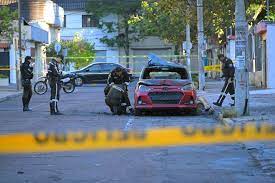Ecuador: A car bomb rocks the city of Quito, and inmates hold 57 guards and police hostage.
57 jail guards and police personnel were taken hostage on Thursday after grenade assaults and two vehicle bombings rocked Ecuador’s capital Quito hours earlier, according to authorities.
The prison rebellion was thought to be a response to a police search of jails the day before to seize firearms. The wave of assaults was an apparent show of power by organized criminal organizations, although no victims were reported.
The SNAI prisons authority was the target of the vehicle bombs; one went off outside its headquarters and the other outside a structure where SNAI offices had stood.
Hours later, according to SNAI, inmates in six prisons around the nation had taken hostage 50 prison personnel and seven police officers.
At a news conference in the nation’s capital Quito, Interior Minister Juan Zapata said, “We are concerned about the safety of our officials.”
The nation, which was until a few years ago a calm sanctuary nestled between the two countries that manufacture the most cocaine in the world—Peru and Colombia—has lately plummeted into bloodshed as it has grown into a major center for drug trafficking.
More than 430 prisoners have died as a result of murders carried out in Ecuador’s jails by competing gangs with ties to Mexican and Colombian cartels since 2021, often leaving a trail of charred and mutilated remains.
General Pablo Ramirez, head of the police’s anti-drug investigations unit, revealed to reporters that one of the rigged automobiles, a sedan, had been filled with “two gas cylinders with fuel, a slow fuse, and apparently dynamite sticks.”
There were no injuries, according to firefighters.
The night also witnessed three grenade explosions in the city, according to Quito Mayor Pabel Munoz.
According to Ramirez, six persons were detained close to the location of one of these explosions, including a Colombian citizen.
They all have a history of homicide, robbery, and extortion, he said.
According to Ramirez, “three of them were arrested 15 days ago for extortionate kidnappings and truck theft… and were released” with restrictions.
INFLUENCE THE STATE
These kind of assaults are uncommon in Quito, but they are evocative of the fear that drug lord Pablo Escobar created in Colombia in the 1980s when he declared war on the government to thwart his extradition to the United States.
According to Ramirez, the incident may have been started by an earlier Wednesday prisoner move intended to stop gang disputes.
In addition, a jail in the southern city of Latacunga was invaded on Wednesday by hundreds of police and military looking for guns, ammo, and explosives.
Numerous prison guards were taken captive by convicts in Cuenca, hundreds of kilometers away, and prisons in five other unidentified places, apparently in protest.
Security Minister Wagner Bravo told FM Mundo radio that “they want to intimidate the state to prevent us from continuing to fulfill the role of the armed forces and the police in controlling these penitentiary centers.”
A 60-day state of emergency for the nation’s prisons was declared by President Guillermo Lasso in July, permitting the deployment of military to maintain control over the jail system.
Drug gangs battle each other on the streets of Ecuador, where the murder rate reached a record 26 per 100,000 people in 2022, almost twice the previous year and higher than rates in Colombia, Mexico, or Brazil. These gangs operate out of jails.
This month, the violence entered politics when Fernando Villavicencio, a presidential contender against corruption, was killed in Quito.
The city of Guayaquil in southwest Ecuador, whose port is essential to the rapidly rising drug traffic to Europe and the United States, has been the one most hit by the violence to yet.
Guayaquil has had vehicle bombings, the hanging of mutilated corpses from bridges, kidnappings, and extortion in addition to horrific jail brawls.







